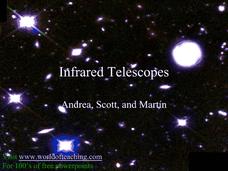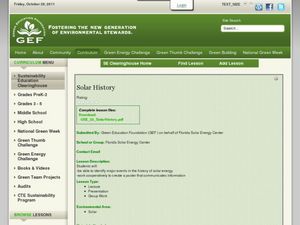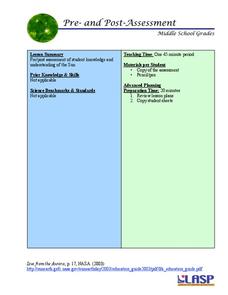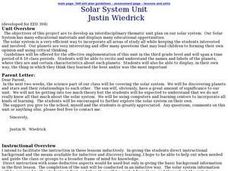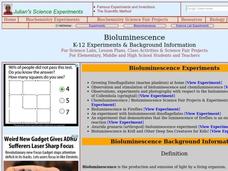Curated OER
Clown Accordion Book
Pupils investigate the letters that form the word "clown". They draw the pictures that coincide with each letter. Students use construction paper for a background and then insert the pictures. Then they write the dialogue for the book.
California Academy of Science
Energy: A Day in My Life
If only we could harness the energy of fifth graders, our energy problems would be over! The class discusses where different forms of energy come from and how we use them. They complete a chart of the activities that they do daily...
Curated OER
You Are What You Eat!
Pupils create believable self-portraits incorporating selected food items as details, forms, and texturesThe compositional focus is a head-and-shoulders portrait appropriate to the food theme resulting in a humorous illustration. Written...
Curated OER
Presidential Endorsements: Newspapers Decide
Students read The Plain Dealer editorial about its "non-support" of a candidate and other articles about this and discuss the newspaper's role in the political process. Students then form an editorial board and debate which candidate...
Curated OER
Presidential endorsements: Newspapers decide
Twelfth graders collect, organize, evaluate and synthesize information from multiple sources in order to draw logical conclusions. They communicate this information using appropriate social studies terminology in oral, written or...
Curated OER
Science Crossword Puzzles: Constellations
If your class is studying constellations, you might consider this crossword puzzle as a light activity to go along with your lesson. Learners solve the puzzle using 9 given clues. You could have your pupils look up the constellations and...
Curated OER
Infrared Telescope
Most of the twenty slides in this presentation include photographs or diagrams, making it an eye-catching way to teach about infrared telescopes. The pros and cons of using infrared light to study outer regions of space are explained....
Carnegie Mellon University
How Power Plants Work 2
In this second of three lessons on power plants, future engineers find out how we generate electricity and how coal-powered plants operate. They work in small groups to make electromagnet generators to light LED bulbs. A set of...
Exploratorium
Bubble Tray
Create jumbo bubbles and use them to teach about surface tension or interference, perfect for a physical science lesson on light or molecular attraction.
Curated OER
Who Lives with Mallard?
Learners color a picture of the habitat featuring mallard and other creatures, some of whom might be camouflaged or half-hidden. They discuss other forms of animal adaptation.
Curated OER
Using the Internet - Art and Design
An interesting resource that might work best in an upper level art course, this handout provides a list of nine websites where young artists can read and study about all forms of art. These online resources range from a dictionary of...
Curated OER
Using Photovoltaic Cells and Systems
This interesting document suggests nine different activities for shedding light on photovoltaic cells. A bit of background information is furnished for you, as well as many, many resource links. Listed for each activity are a learning...
Curated OER
Solar History
Using the sun's light as a source of energy is not a new concept. Give your environmental studies, engineering, or physical science class this list of how humans have used solar energy throughout history. Assign groups a certain time...
PHET
The Sun: Pre- and Post-Assessment
Want to see how far pupils have come since the beginning of the unit? This activity is designed to be a pre- and post-assessment for a unit on the Sun. The first in a series of 18 that can be combined to form a complete unit. Two...
Curated OER
Herschel Infrared Experiment
Students perform a version of the experiment of 1800 by the famous astronomer Sir Frederick William Herschel.
Curated OER
Obtain a visible spectra of chlorophyll a
Students become familiar with the concept of spectroscopy or the study of the interaction of matter with electromagnetic radiation. They prepare solutions and measure absorbance at different wavelengths. Pupils comprehend that mater and...
Curated OER
Ozone
Students locate the ozone layer of the atmosphere. They explain natural formation of ozone. They list chemicals that react with ozone. They explain how CFC's destroy ozone.
Curated OER
Electricity
In this electricity worksheet, students review scientists and inventors of electricity. how electricity is transported, and how electricity is measured. This worksheet has 16 problems to solve, 5 fill in the blank, and 7 short answer...
Curated OER
Solar System Unit
Young scholars probe an interdisciplinary unit on our solar system. Distances between planets, their characteristics, and applications to student's personal lives are analyzed in this experience. The unit contains seven lessons.
Curated OER
Colored H2 Balloon Explosions
Students perform an experiment in which they put different types of salts in a balloon, fill it with hydrogen gas, and ignite it. The electrons in the salt molecules are excited by the heat and release energy in the form of light. ...
Curated OER
Bioluminescence
Students differentiate chemiluminescence from bioluminescence. In this biology lesson, students explain how fireflies and other animals emit light. They discuss the applications of engineered bioluminescence.
Curated OER
Candy Reaction
In this triboluminescence worksheet, learners use wint-o-green Lifesavers to observe a chemical reaction that gives off light. They break a lifesaver up with a hammer and make observations and they chew a lifesaver and make observations....
Curated OER
Only the Shadow Knows
Students become familiar with the causes for formation of shadows. They create shadows, compare the size and shape of the shadow with the actual object, engage in shadow play theatre, and discover what happens to shadows when there is...
Curated OER
Unraveling the Mysteries of Objects in Space
Students study emitted and absorbed light, and label each type of spectrum. They identify elements by their spectral signatures and use a spectroscope.






